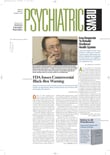After giving birth, many mothers experience fluctuating moods for a few weeks, while a minority experience severe depression that can last months.
Up to 80 percent of postpartum women experience the “baby blues” within 10 days of childbirth. This condition is characterized by rapid changes in mood and by irritability, anxiety, and tearfulness, explained Nada Stotland, M.D., a professor of psychiatry and professor of obstetrics and gynecology at Rush Medical College in Chicago.
Stotland, who is also APA secretary, testified on behalf of APA at a hearing held by the House Energy and Commerce Subcommittee on Health in late September on “Improving Women's Health: Understanding Depression After Pregnancy.” Stotland discussed the impact of depression and other disorders in general on women and the importance of DSM as a diagnostic tool. She also urged Congress to pass the Sen. Paul Wellstone Mental Health Equitable Treatment Act of 2003 (S 486), which APA strongly supports.
Stotland, a constituent of health subcommittee member Rep. Bobby Rush (D-Ill.), testified at the request of subcommittee Democrats. Rush is the sponsor of the Melanie Blocker-Stokes Postpartum Depression Research and Care Act (HR 846), whose purpose is to provide for research on and services for individuals with postpartum depression and psychosis. The subcommittee members also heard from witnesses testifying about postabortion mental health issues.
An estimated 400,000 postpartum women in the United States are affected by some type of mood disturbance, said Stotland.
Postpartum depression affects between 10 percent and 20 percent of women. It develops within the first three months of birth and is more persistent and debilitating than the so-called “baby blues.”
“It is often missed because new mothers are discharged quickly from the hospital, and the health care system is primarily focused on the care and well-being of the infant,” Stotland testified.
Among the risk factors for postpartum depression are a history of depression, previous episode of postpartum depression, and depression during pregnancy, she explained. Episodes of psychotic illness can be triggered by the biological and psychological stresses of pregnancy and delivery. Researchers believe they are a manifestation of bipolar disorder, she continued.
“Psychotic episodes are rarer, affecting an estimated 1 to 2 women per 1,000 births. The signs include mood fluctuations, severe agitation, confusion, thought disorganization, hallucinations, and sleeplessness,” she said.
“This is an extremely serious psychotic disorder that usually requires hospital treatment. Left undiagnosed or untreated, some mothers have committed infanticide followed by suicide,” Stotland said.
Stotland also testified on allegations that postabortion depression and postabortion psychosis exist as diagnoses.
“Advocates of these designations typically argue without foundation that abortions can have a long-term impact on the mental health of women who elect to terminate a pregnancy,” Stotland stated. Rigorous objective studies have confirmed that abortions are not a significant cause of mental illness, she emphasized.
That doesn't mean that some women who undergo abortions aren't deeply distressed, however. “But self-selected accounts of great unhappiness post abortion, however personally compelling, are not scientific studies,” she said.
Stotland pointed out that unwanted pregnancy is a major stressor in a woman's life. In addition, the strongest predictor of postabortion psychological outcome is a history of depression prior to becoming pregnant.
“Other factors can include whether the pregnancy is terminated because of medical or genetic risks of complications and a feeling that the decision to abort wasn't freely made,” Stotland testified.
“If Congress wants to take one single action that would make a world of difference for all women—for all persons— needing mental health care, I suggest that Congress promptly pass legislation to end discriminatory coverage of treatment of mental illnesses.”
It can do so, she said, by passing the Sen. Paul Wellstone Mental Health Equitable Treatment Act. This bill, named in honor of the late senator who devoted much of his congressional career to mental health issues, is cosponsored by more than half of the House of Representatives and two-thirds of the Senate, she noted.
The bill would provide the same health insurance coverage for mental illnesses as provided for other medical illnesses, including the same financial and treatment limits.
The text of HR 846 and S 486 can be accessed online at<http://thomas.loc.gov> by searching on their respective bill numbers. Stotland's testimony is posted at<www.psych.org/advocacy_policy/leg_res/apa_testimony/20040929StotlandTestimonyonUnderstandingDepressionAfterPregnancy.pdf>.▪
